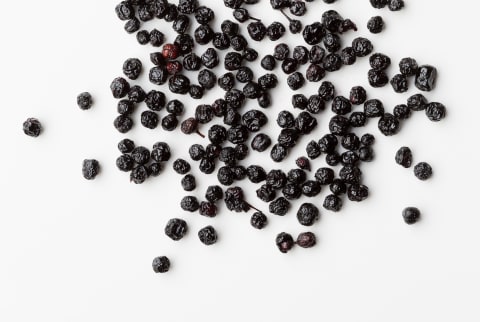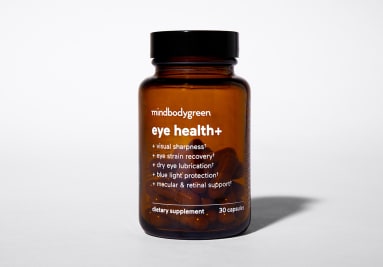Author: Expert reviewer:
March 31, 2023

Expert review by
Ashley Jordan Ferira, Ph.D., RDN
mbg Vice President of Scientific Affairs
Ashley Jordan Ferira, Ph.D., RDN is Vice President of Scientific Affairs at mindbodygreen. She received her bachelor’s degree in Biological Basis of Behavior from the University of Pennsylvania and Ph.D. in Foods and Nutrition from the University of Georgia.

March 31, 2023
Our editors have independently chosen the products listed on this page. If you purchase something mentioned in this article, we may
While the maqui berry might not be the first fruit that comes to mind when you hear the word “berry,” this antioxidant-packed superfruit is definitely one to know about. Still, even if you’re new to maqui, you may want to learn more about all the different benefits it can offer.
Native to South America, maqui berry has been traditionally used by the Mapuche Indians in Chile as both a food source and healing botanical. Rich in polyphenols and antioxidants, the maqui berry can be used today to support visual performance in the digital age, promote balanced blood sugar levels, and even bolster a healthy inflammatory response at the cellular level.*
Advertisement
This ad is displayed using third party content and we do not control its accessibility features.
We’re unpacking the surprising benefits that maqui berry enthusiasts can’t get enough of—from promoting eye health to balancing blood sugar and more.*
What is maqui berry?
Maqui berry, also known as Aristotella chilensis, is a superfruit that can be eaten raw or squeezed into a juice. Maqui berry has been used for healing purposes for years as it is plentiful in antioxidants, which are crucial to quenching free radicals and supporting overall health at a cellular level.*
“The maqui berry is a small dark purple berry that grows in Chile and southern Argentina. It’s considered one of the latest ‘superfoods’ because it’s incredibly high in antioxidants,” explains sports dietitian Erica Giovinazzo, M.S., R.D., CPT. “It’s most abundant in anthocyanin, a phytonutrient [that] gives the berry its deep purple/blue color. It’s the same type of phytonutrient found in blueberries, red grapes, and red cabbage. In the maqui berry, its anthocyanin is particularly high in one of the bioactive compounds called delphinidin, which is the reason it might be such a powerful little fruit!”
Benefits of maqui berry
Antioxidants are the body’s defense against free radicals, the unstable atoms that can encourage faster effects of aging if not properly balanced. Thanks to the natural antioxidant levels of maqui, adding maqui berry to your daily routine can help balance those pesky free radicals.*
Advertisement
This ad is displayed using third party content and we do not control its accessibility features.
1.
Combats oxidative stress
“Oxidative stress occurs when the cells in our bodies react to oxygen-reactive species, which can negatively impact our cellular signaling,” optometrist Victor Paul, O.D., of DeCesare Eye Care, tells mindbodygreen. “Environmental stressors—including UV rays and pollutants, to name a few—increase free radicals in our bodies.”
In a 2015 randomized controlled trial (RCT) published by the Journal of the American College of Nutrition, researchers found that maqui berry extract helped improve oxidative status in healthy adults.* You can thank the berry’s phytonutrients anthocyanin and delphinidin for these impressive antioxidant actions.
“Almost all of the proposed benefits of maqui berry [are] because of the high amount of anthocyanin (and, specifically, the bioactive compound delphinidin) in the fruit,” Giovinazzo explains. “The phytonutrient works primarily by promoting a healthy inflammatory pathway in our body. Anthocyanins reduce oxidative stress by combating free radicals, including UV rays (to help promote healthy skin and anti-aging) and lipid peroxidation.”*
In a recent animal study published in Oxidative Medicine and Cellular Longevity, scientists found that oxidative stress implicated cellular structures, giving rise to undesirable conditions and faster aging. The anthocyanin and delphinidin levels in maqui berries promote an overall healthy homeostasis in the body, staving off the oxidative stress linked to such life-disrupting health issues.*
Smaller amounts of free radicals can also promote healthy, youthful skin1 that’s so shiny and bright it almost glows. Studies show that maqui berry combats the enzymes known to break down collagen, keeping the elasticity of your skin cells so they can look as young and vibrant as possible.*
“Initial studies suggest that maqui berry can be good for the skin because it might have some protective effects against premature aging of skin,”* Giovinazzo says. “UV rays can lead to wrinkles and other unwanted skin concerns. The antioxidants in maqui berry can help combat free radicals formed as a result of the sun.” Because of the skin benefits of maqui berry, it can be helpful to anyone that frequently deals with sun exposure.
Carrots aren’t the only food that can promote healthy eyes; research from the journal Edizioni Minerva Medicine reveals that maqui berries can promote a healthy inflammatory response at a cellular level and encourage moisture in the eyes.*
“Due to maqui berry’s healthy pro-inflammatory actions, it can help with eye dryness in addition to improving overall tear production,”* Paul explains.
“Maqui berries are rich in antioxidant content, which can help optimize inflammatory pathways on the ocular surface by combating oxidative stress that impacts our oil glands, helping to restore a stable tear film,”* he adds.
Eye longevity supplements can be a great solution for combating eye dryness and supporting overall ocular oxidative balance.* For example: mindbodygreen’s eye health+ features Patagonian maqui berry, as well as additional eye-supporting bioactives and botanicals lutein, zeaxanthin, astaxanthin, and saffron to further bolster visual acuity and eye longevity.*
Advertisement
This ad is displayed using third party content and we do not control its accessibility features.
3.
Supports cardiovascular function
“Maqui berry might support cardiovascular function2 in two ways,” Giovinazzo says. “The first is through its antioxidant effects, which help neutralize free radicals, and the second is through potential antiplatelet properties, which help the blood be less sticky.”*
Giovinazzo adds, “[These cardiovascular benefits] seem quite possible due to the high amount of anthocyanins in maqui berry.”*
Some of the heart-helping features of maqui berry, Paul maintains, are balanced levels of insulin following a meal and reduced levels of low-density lipoprotein (LDL, aka “bad”) cholesterol.* Both promote cardiac efficiency and proper blood flow.
4.
May help balance blood sugar
Speaking of the cardiovascular benefits maqui berry can offer, that improved cardiovascular function goes hand in hand with maqui’s ability to potentially help balance blood sugar.*
“Initial research suggests that maqui berry might help balance blood sugar3 by lowering the blood sugar ‘spike’ after eating and helping sugar be removed from the body through the urine,”* Giovinazzo says. This can help support insulin sensitivity, metabolic health, and even healthy body composition.*
While more research is certainly needed, staying within the target range of your blood sugar levels helps with a more energetic feeling and promotes a positive mood. And as it turns out, maqui berry might be able to do just that.*
Advertisement
This ad is displayed using third party content and we do not control its accessibility features.
How to use maqui berry
“Maqui berry is loaded with vitamins that help our bodies perform their basic metabolic functions,”* Paul says. “Vitamins in general act as coenzymes and help to regulate our metabolism. Someone who is looking to get added nutrition, regulate his or her metabolism, and have increased immune support may want to consider taking maqui berries.”*
For anyone wanting to add maqui berry to their daily routine, there are several different ways to get it in your system (and start reaping its benefits).
“Maqui berry comes in powders, gummies, and extract to be taken orally. Powders can be made into drinks and shakes, gummies can be swallowed, and extracts can also be put into liquids,” Paul explains.
For anyone interested in getting their maqui berry from a supplement, look for maqui berry as a main ingredient. It’s also sometimes referred to as “Chilean wineberry” on supplement labels.
There’s also mindbodygreen’s eye health+ to consider—it delivers the benefits of maqui berry, astaxanthin, lutein, zeaxanthin, and saffron to promote visual sharpness, focus, and performance; support eye strain and screen fatigue recovery; enhance eye lubrication and tear production; bolster blue light filtering and photoprotection; and provide targeted macular and retinal support.*
If you are able to find fresh maqui berries locally, you can also get them as a food source—but Giovinazzo warns to check the label of any products containing this antioxidant-rich fruit: “The one thing to watch out for is products that add sugar to sweeten the taste! Adding that sugar is going to negatively impact your inflammatory pathways and take away some of the health benefits,” he says.
FAQ
What is the maqui berry good for?
Maqui berry delivers a number of health benefits—including combating free radicals, promoting a healthy inflammatory response, and supporting eye health.*
Because of the skin benefits of maqui berry, it can be helpful for anyone that frequently deals with sun exposure. In addition to the glowing effects maqui berry has on the skin, maqui berry also promotes healthy blood glucose levels and insulin sensitivity, which may also promote healthy body composition.*
Does maqui berry have side effects?
More research is required in order to better understand (or locate) any potential side effects that maqui berry might have. As of now, the likelihood of side effects is low.
“Maqui berry is not known to have any side effects and is considered generally safe. People with allergies to maqui berry may experience a sensitivity and reaction and should otherwise not consume it until speaking with their physician,” Paul suggests.
How long does it take for maqui berry to work?
“Everyone will be different, and more research still needs to be done, but most of the current research is showing that it may take two to three months to see the purported health changes,” Giovinazzo says.
If you’re specifically looking for eye health support, however, Paul says you can expect results in a slightly shorter time span. “It can take up to one to two months to see an improvement in ocular surface health, but results vary for every individual person based on their own health history as well as environmental exposures,”* he explains.
Advertisement
This ad is displayed using third party content and we do not control its accessibility features.
The takeaway
The surprising benefits of maqui berry make for a long, long list. While you may not have heard of this superfruit before, it’s not one to be ignored (especially if you seek eye health benefits since it contains antioxidants with targeted daily retinal and macular support that help enhance visual sharpness, support ocular blood flow, and bolster eye lubrication).*
Taking a targeted eye longevity supplement in which maqui berry is a featured ingredient—like mindbodygreen’s eye health+—can be helpful for anyone looking to enhance their visual performance, reduce their sensitivity to light, or support recovery from screen fatigue.* Other potential maqui berry benefits include eye strain reset support, blood sugar balance, and support for healthy inflammatory response at the cellular level.*
As always, if you’re thinking about adding a supplement to your diet or making other dietary or lifestyle changes, be sure to consult with your health care provider first.
If you are pregnant, breastfeeding, or taking medications, consult with your doctor before starting a supplement routine. It is always optimal to consult with a health care provider when considering what supplements are right for you.

